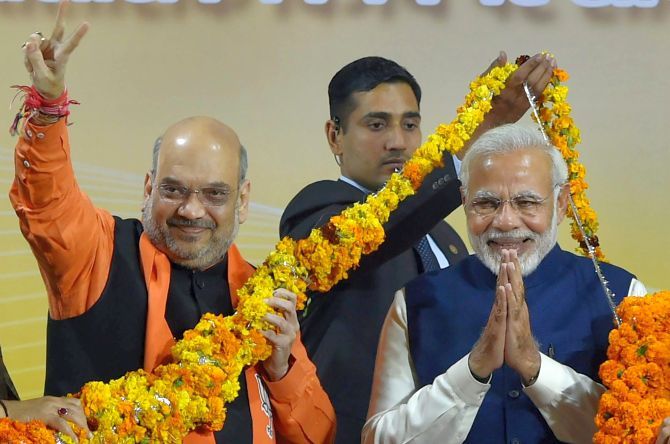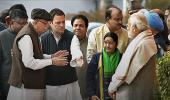The narrow win in Gujarat can be contributed to Prime Minister Narendra Modi with his no-holds-barred approach and party president Amit Shah who plays to win and knows that there are rules to be followed when suited and broken when needed, observes R Jagannathan.

Photograph: Shahbaz Khan/PTI Photo
The big whoosh you hear today is probably the collective sigh of relief in the Bharatiya Janata Party camp as the party retains control of Gujarat despite a strong scare from the Congress and assorted disgruntled caste groups. The narrow margin of victory, where the party even looked like losing at some points in the counting process, means that the BJP is vulnerable politically. Party president Amit Shah’s target of 150 seats clearly was bluster and pie-in-the-sky.
A side point needs to be made in advance. While the exit polls got the BJP victory right, they overstated the party’s prospects, bringing the profession into some disrepute. Clearly, the pollsters need to introspect as much as the BJP itself.
A small sigh of regret can probably be heard from another camp, with the Congress failing to break into the fortress, and Rahul Gandhi lost the opportunity of becoming Congress president on a triumphant note, with the reputation of a man who bearded the lion in his own den. But he came close and few Congressmen will deny him some credit for giving the BJP a huge scare.
The reality today is the BJP’s ability to retain a state it has ruled continuously for 22 years, and where disaffection among many groups -- farmers, unemployed youth, and small businessmen fretting about GST compliance -- gave the Gandhi scion an opportunity to try and change the narrative in Gujarat. To its credit, the Congress party picked up these signals and went hammer and tongs at the chinks in the BJP’s rusting armour.
Two men -- Narendra Modi and Amit Shah -- are totally responsible for rescuing the BJP from the jaws of an embarrassingly poor show, if not possible defeat, this time.
The possibility of an ignominious defeat in the prime minister’s home state appeared real, with one pre-poll survey (by CSDS-Lokniti) putting the vote shares of Congress and BJP level at 43 per cent, and other polls showing a consistent downward trajectory in the vote share gap between the two parties. When vote gaps head in one direction, the possibility of a shock verdict could never have been ruled out.
Luckily, the Modi-Shah duo spotted the problems early, and worked hard to halt the slide from the last week of November onwards, and the results are there for everyone to see.
The shift in voter mood is the result of three proactive steps by the BJP: one involved making changes to GST pain points by mid-November, to make compliance easier; the next was to deploy Modi as the battering ram to ensure that Gujarati asmita and some religious undercurrents were infused into the election theme so that the economic failures of the government -- both at the Centre and state -- did not dominate the agenda; and the third was a bold decision to stop appeasing the Patidars by promising all kinds of quotas.
This would have ensured that any polarisation among Patels would have been at least partially offset by other castes weighing in favour of the BJP. The Patidar agitation damaged the BJP, and the party clearly has to figure out how to mollify this community which has often impacted outcomes in state elections.
Despite being bruised badly in this skirmish, a clear win despite loss of seats and vote share shows that Shah and Modi are masters of the electoral game, and know which emotional buttons to push when they face adverse voter reactions to their performance.
To be sure, this election was more important to the BJP than the Congress for the simple reason that a loss in the prime minister’s home state would have sent strong signals that Modi was vulnerable, with consequences for governance in the remaining tenure of the central government, and prospects for gaining allies in the run-up to 2019. It needs underlining: any loss in Gujarat would have directly impacted Modi’s hopes for a second term.
Estranged ally Shiv Sena is already dancing with joy and other key allies like Chandrababu Naidu may still consider distancing themselves from the BJP in the run-up to 2019, as had happened with in 2004. But this need not happen if Modi and Shah now stop taking the allies for granted from now on.
The BJP’s top duo know that in a situation where the BJP ends up with 180-200 seats in 2019, and the Congress a bit lower, it is the latter that can get the allies more easily. Under a strong leader like Modi, allies do not get the kind of operational freedom -- to run their ministries in silos and as vehicles for generating illegal cash -- as under a weak Congress party.
The Congress played all its cards correctly this time. It rightly decided that the BJP’s core vote was Hindu, and realised that it repeatedly gifted past elections away by drumming up 2002 and playing the minority card. This time, Rahul Gandhi spent most of his time temple-hopping, and focused on economic themes. He gave almost no time to wooing minorities, assuming that their vote is always there for the Congress if it looks like winning.
But this is where the BJP reversed the tables. In the previous three elections, the BJP did not have to create the majority-minority fault lines; the Congress did it, and the BJP happily harvested the vote.
But with Gandhi rushing to temples to prove he is a true Hindu, it was the BJP that had to subliminally invoke this fault line by references to Congress plots with Pakistani nationals, and references to Aurangzeb.
This was Modi’s lowest point, but this was probably needed to pull the party over the finish line where the possibility of economic themes dominating was real. But the Congress really needs to rein in its loudmouths, including Mani Shankar Aiyar, who have given Modi an entry point with his “neech” comment, and Kapil Sibal, with his decision to bat for a delay in the Ayodhya hearings and comment that Modi is not a true Hindu.
The key thing to realise about Modi is that he is a different person when campaigning, and different when he is just prime minister. As PM, he is the very epitome of political correctness. But give him an election challenge, and he dives in with a no-holds-barred approach whenever he thinks it can deliver the vote.
In Uttar Pradesh, we noted Modi’s references to samshanghat and kabristan, and few were any wiser understanding what the need was for that reference. But surely this reference came from a local fault line that was worth harvesting.
What Gujarat shows it that Modi and Shah play to win.
The rules are there to be followed when it suits them, and broken when that helps.
The narrow Gujarat win and the big win in Himachal Pradesh places the BJP in a degree of comfort for 2019, and even potential losses in the 2018 elections -- in Karnataka, Chhattisgarh, Rajasthan and Madhya Pradesh -- cannot change that script. Reason: in 2019, people will be voting for Modi, and not Shivraj Singh Chouhan or Vasundhara Raje or B S Yeddyurappa. This is why Gujarat was a state the BJP could not afford to lose. A loss here, even if there were wins elsewhere, would have weakened Modi more than anything else.
But the BJP has a huge challenge ahead and must learn the right lessons from the Gujarat scare.
First, it’s the economy, stupid. In the last three-and-a-half years, the central government has not been able to reverse the slowdown or enable jobs creation. It simply has not come to grips with this challenge. This has to be priority No 1 in 2018.
Second, the party has been taking its core Hindu and business vote for granted - which is why the PM had to tug at the Hindu chord and rush to fix the GST pain points towards the end of the election campaign.
The danger is that the BJP should not now let things slide to a point where communal polarisation gets out of hand by 2019 and the key to BJP victory. The Congress has realised that it cannot be seen as a pro-minority, anti-Hindu party, which may push the BJP to take more extreme positions on wooing back the Hindu vote. The Gujarat vote marks a split in the BJP’s Hindu vote bank for the first time since 2002.
Third, the BJP has to learn the same lesson that the Congress has refused to learn: state elections need visible state leaders and leaders should not be imposed from above. This, unfortunately, is what the BJP did by imposing Vijay Rupani as Gujarat CM, and he has duly failed to enthuse the cadre and even came close to losing his seat.
The BJP clearly needs a state leader who has the support of the local party and who looks to be his own man and does not look to Delhi for rescue every time he gets into a political jam. The state government’s inability to handle the Patidar challenge is the direct result of this lack of credible local leadership.
For the Congress, the lessons are simple.
First, as the challenger party it has to focus on the government’s failures and not on proving whether Rahul Gandhi is a genuine janeu-dhari Hindu or not. By shifting focus to Hindu identity, it is playing on the BJP’s turf. The only thing it needs to ensure is to stop encouraging minority communalism to reap a bloc Muslim vote.
Second, it needs to develop local leaders even more than the BJP. This lack might be what prevented it from making a decisive dash for victory even when ground conditions were favourable in Gujarat.
Third, it needs to worry about new challenges to its leadership from the rise of young and aggressive leaders like Hardik Patel, Alpesh Thakor and Jignesh Mewani. Like the rise of Arvind Kejriwal in Delhi, these new leaders may well find more traction than the Congress in future.
The rise in the Congress’s performance is a plus but it has ridden on the shoulders of new youth leaders. The question is why would they want the Congress to gain from their efforts when they could be gaining political muscle themselves? Hardik Patel was not old enough to stand for elections this time but in the next elections, he could be a candidate himself.











